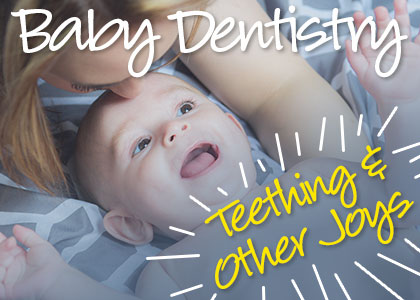Baby Dentistry: Teething and Other Joys

It’s easy to think that baby teeth aren’t important. They make their grand entrance (however painfully) and leave your baby’s mouth so soon thereafter. But your baby’s oral health is very important today and to set the stage for a lifetime of health.
Let’s talk about those tiny teeth: teething and how to take care of your baby’s oral health.
Teething Facts
- Teething begins anywhere from 3-9 months and can continue until your child is 3-years-old. Every baby is different.
- Teeth emerge in a consistent pattern: lower 2 front incisors; upper 2 front incisors and 2 more lower incisors; first set of molars; canines; then second molars.
- One reason we get baby teeth is because our baby mouths aren’t big enough for the size and number of adult teeth we need later in life.
- Babies get 20 teeth that fall out and are followed by 32 adult teeth.
- Chewing on a cold, wet washcloth, extra snuggles, and a little pain-relieving medicine is certain to help ease the pain of teething.
- Contrary to popular belief, teething is not proven to cause sickness like diarrhea, fever or a runny nose.
- Children should see the dentist as soon as their first teeth start coming in.
How To Take Care of Baby Teeth
- Breastfeeding: According to a recent study, babies that exclusively breastfed for at least six months have a 72% less chance of developing an improper bite. Breastfeeding also reduces your child’s risk of Baby Bottle Tooth Decay and cavities.
- Baby Bottle Tooth Decay: Overexposure to sugar in the liquids your baby drinks can cause early tooth decay, which is when the important, hard enamel cover on your teeth breaks down. Enamel never grows back so it’s very important to protect. Avoid baby tooth decay by only using formula and breast milk in your child’s bottle, don’t let them fall asleep drinking from the bottle, and never put honey or sugar on their pacifier.
- Cleaning: “Welcome to earth! Now, let me wash your gums.” It may seem silly, but you’re actually supposed to wash your baby’s gums from the first day they are born. Use a clean washcloth and water, and maintain the habit as all the baby teeth start coming in. Fluoride toothpaste is recommended after your child turns 3. Fluoride-free toothpaste or “training toothpaste” is popular for kids under 3.
- Thumbs and Pacifiers: Talk with your dentist about thumb sucking and pacifier use. Usually, both are fine until babies become little children. However, they can increase your child’s risk of tooth decay, jaw misalignment, and an improper bite. Consider weaning off either habit depending on what your dentist recommends.
- Insurance for Pediatric Dental Care: Most states cover dental visits for children on governmental support. And most dental offices have flexible payment plans to help everyone prioritize oral health for the whole family. Don’t let finances hold you back from keeping your babe as healthy as possible—reach out to us, we’re happy to help.
And last but not least, it’s super important for babies to see the dentist regularly once their first tooth has emerged! They have real teeth, after all. Dr. Brewer in Lexington is a professional dentist who cares for baby teeth and pediatric oral health.
Visit Brewer Family Dental by calling us today to make an appointment. We’d love to see your little bundle of joy smile.
Sources
http://pediatrics.aappublications.org/content/early/2015/06/09/peds.2014-3276
https://www.scienceworld.ca/blog/why-do-we-have-baby-teeth
from Brewer Family Dental https://dentistinlexingtonky.com/baby-dentistry/

Comments
Post a Comment